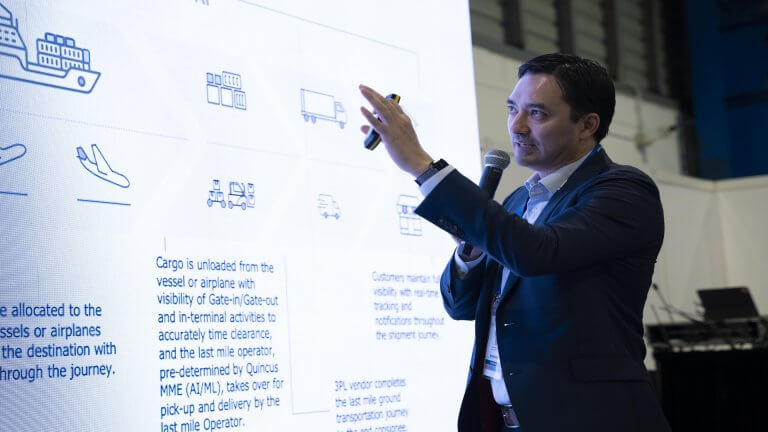
Navigating Supply Chain Disruptions: Quincus’ Innovative Solutions
Explore how Quincus leverages AI and Machine Learning to fortify global supply chains against cyber threats, environmental crises, and network disruptions, ensuring operational resilience and innovation.
In an era of global uncertainties, supply chain disruptions have become a significant challenge for businesses worldwide.
Supply chain disruptions can stem from various sources, including natural disasters, global crises, transportation issues, cyber threats, and unforeseen market fluctuations. These disruptions can lead to delays, increased costs, and potential damage to a company’s reputation. Therefore, it becomes imperative for businesses to address and mitigate these challenges proactively.
Quincus navigates challenges using advanced AI and Machine Learning for operational continuity and resilience.
Quincus Solutions to Unexpected Events
Quincus anticipates challenges and provides adaptive solutions to shippers, port operators, 4PLs, 3PLs, and freight forwarders across different industries, from consumer products, energy and resources, manufacturers, retail, automotive, and life sciences. Discover how Quincus is effectively mitigating some of the major supply chain disruptions below:
1. Addressing Cyber Security Threats:
Quincus proactively addresses cyber security threats in the supply chain through innovative initiatives that bolster customer security and protect operational integrity. Measures such as authentication tracking URLs and enhanced user role permissions ensure limited access to sensitive information, improving privacy and preventing unauthorized transfers. Committed to continuous improvement, Quincus remains at the forefront of cyber security, dedicated to safeguarding user privacy and fortifying the supply chain ecosystem.
In a hypothetical scenario where cybercriminals target a high-value shipment, Quincus’s enhanced security measures successfully block unauthorized access to sensitive details like product specifications and sender/consignee addresses. Regular security audits and assessments proactively identify vulnerabilities and ensure compliance with industry standards and regulations. This comprehensive approach safeguards user data and keeps Quincus ahead of emerging cyber threats, maintaining the highest level of protection for all stakeholders.
Quincus further ensures comprehensive data security through advanced encryption practices for Data in Transit and Data at Rest. State-of-the-art encryption secures Data in Transit, while Data at Rest is protected at the disk level. The platform supports Multi-Factor Authentication (MFA) through seamless integration with leading Identity Providers (IDPs), utilizing MFA for an added layer of security.
Regarding real-time security, Quincus employs a comprehensive threat monitoring system at the infrastructure level, seamlessly integrated with an alerting service to provide immediate notification of critical threats. Going beyond real-time threat detection, Quincus adopts proactive measures, including regular automated security testing on production-bound code.
In the fast-evolving digital environment, Quincus serves as a robust shield, protecting your supply chain from potential cyber threats.
2. Mitigating Unforeseen Environmental Crises:
Quincus employs an innovative approach to mitigate the impact of unforeseen environmental crises on supply chain operations by integrating Predictive Modeling, Adaptive Routing, and the Multi-Modal Engine (MME). Leveraging real-time environmental data, predictive modeling anticipates potential crises, enabling proactive planning.
Also, adaptive routing dynamically responds to changing conditions, swiftly rerouting shipments to avoid affected areas and optimizing operations in real-time. For example, in the event of heavy rain, the platform anticipates issues such as floods and traffic surges and transports the order through a different route to ensure it gets to its destination on time.
The Multi-Modal Engine complements this strategy by utilizing advanced AI and machine learning to navigate transportation networks efficiently, pinpointing optimal routes despite crisis-induced challenges. Together, these technologies ensure timely deliveries and minimize disruptions, highlighting Quincus’ commitment to a proactive and technologically advanced approach to navigating and mitigating the effects of environmental crises on the supply chain.
In addition to responding to current challenges, Quincus actively addresses future risks through insightful recommendations. The platform utilizes predictive analytics to assess potential environmental threats and offers strategic guidance for optimizing supply chain routes and processes. By continuously analyzing historical and real-time data, Quincus provides valuable insights that guide businesses in preemptively making informed decisions to address environmental challenges.
3. Overcoming Network Disruptions:
Quincus ensures “Transparency and Real-Time Tracking” resilience even amid network disruptions by employing adaptive technologies that store and synchronize data efficiently, enabling real-time tracking to persist seamlessly. For instance, in the event of a network loss at a specific point, the milestone can be updated subsequently to maintain comprehensive end-to-end visibility via Quincus’s offline functionality. Users can continue accessing critical information even when there is no network connectivity.
For example, the QDriver Mobile app stores essential data locally and syncs with the central database once connectivity is restored. The system prioritizes end-to-end visibility, allowing businesses to monitor shipment progress, receive timely updates, and proactively respond to disruptions despite network challenges.
This commitment to transparency empowers businesses with the tools needed to make informed decisions, fostering a streamlined and proactive response to disruptions and ultimately ensuring a resilient and informed supply chain network.
Predictive analytics plays a pivotal role in proactively anticipating and addressing potential network disruptions. By analyzing historical data and network patterns, Quincus identifies potential points of failure.
For instance, if historical data reveals consistent patterns of network disruptions in specific regions or during particular times, Quincus utilizes predictive analytics to suggest alternative routes or preemptive actions. This forward-looking approach empowers businesses to adjust strategies in advance, minimizing the potential impact of disruptions on shipments.
Conclusion
In navigating the complexities of today’s global landscape, Quincus, a logistics solutions leader, adeptly addresses supply chain disruptions, ensuring operational continuity. From tackling cyber threats to using innovative technologies like Predictive Modeling and Adaptive Routing for unforeseen challenges, Quincus offers cutting-edge solutions.
Even amid network disruptions, Quincus prioritizes “Transparency and Real-Time Tracking.” The system gives businesses end-to-end visibility, enabling efficient monitoring and response to disruptions.
As businesses strive to overcome disruptions, Quincus is a reliable partner dedicated to providing clear and concise solutions. In logistics, Quincus remains committed to empowering businesses for growth, even amidst the unexpected.
Request a demo with us to find out more.
Subscribe to keep up with our latest news









